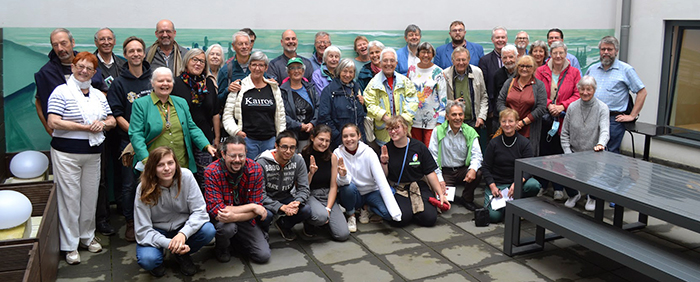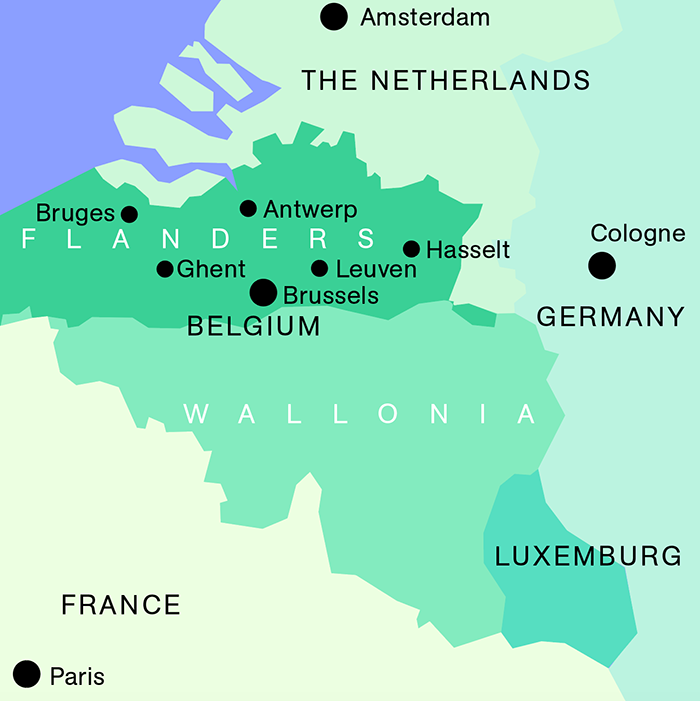My Benelux Esperanto Conference Experience

By Jean Annet, Namur, Belgium
Editor’s Note: Esperanto is a constructed language, created in the nineteenth century by L. L. Zamenhof, an eye doctor in Poland, then part of the Russian Empire. He decided to create an international language that would be used as a neutral language between all nations on Earth. In the early 2000s, a Frenchman, JeanMarie Chaise, completed a draft translation of The Urantia Book into Esperanto. In 2020, Urantia Foundation accepted a proposal from an international team to improve the text and ready it for publication.
From September 30 to October 3, 2021, the Beneluksa Kongreso took place in Charleroi, Belgium. It was a gathering of about 60 Esperantists, mainly Belgians because of travel restrictions. There were of course Flemish and Walloons, which in Belgium makes it an "international" meeting!
It was my privilege to give a lecture presenting The Urantia Book to about 20 participants. As I am not yet an expert in Esperanto (I understand it very well, but I don't speak it yet like my mother tongue, French) I used a PowerPoint presentation developed with a language specialist. Prior to giving my lecture, I was able to talk with several people about the book, which helped enrich my Esperanto vocabulary specific to the themes of the book.
The advantage of presenting The Urantia Book to Esperantists is that they already have an ideal of justice and brotherhood. They are learning the language to give each other the opportunity to communicate in an equal way, without anyone having an advantage because of their native language. Moreover, the creator of the language “Esperanto,” Ludovic Zamenhof, not only wanted to find a bridge between all languages through Esperanto, but also one between all religions. I was able to find a quote from him that said: "My plan is to create a religious union that would peacefully embrace all existing religions." For this he referred to the Jewish rabbi Hillel. “Hillelism is a teaching which, without tearing man from his homeland, language or religion, gives him the possibility of communicating with people of all languages and religions on a neutral human basis, on the principles of mutual brotherhood, equality and justice."
Not all Esperantists have this ideal in relation to religions, but some do. And they are very receptive to the fundamental message of The Urantia Book: the brotherhood of men under the fatherhood of God.
Several people were interested enough, in any case, to want to start a group to read the book. One of them, Alex, had a rather amusing anecdote. Thirty years ago, he bought a copy of El libro de Urantia. (He was living in Catalonia, Spain at the time.) As soon as he began reading, he decided that it was too complicated, so he returned it to the bookstore. Meanwhile, he continued his spiritual quest and recently read online that someone was accusing an author of plagiarizing The Urantia Book. Hence, one month before the conference, he bought the book again, this time in French! He was obviously very surprised to see that the conference program listed a presentation on the book. We even changed the time of the presentation so that he could attend.
After the conference, we started our first reading group of The Urantia Book in Esperanto. Currently there are four of us. We are not yet international, except for Alex, who is Catalan-Flemish and lives in Wallonia (the French-speaking area of Belgium), but it is already planned that I will give another lecture in Germany at the end of the year. If the borders reopen, I will be able to give more lectures at European Esperantist meetings. This will allow us to really constitute an international group in Esperanto.
The Esperanto translation of The Urantia Book continues, and thanks to this new reading group, we have been able to improve the translation quality. New readers will confirm that the true meaning of the text is conveyed. After all, some words may seem to have an obvious meaning, but with deeper study, we find that they carry an altogether different interpretation.
In addition, there are what are call false friends—ordinary words like personality, realization, and many others—which must be translated into Esperanto in a more nuanced way. It is by reading and rereading the text with new and experienced readers that we progress towards the most accurate translation possible.

Attendees of the Benelux Esperanto Conference

Flanders / Wallonia
Annual Reports
Appointments
Audio Urantia Book
Board Meeting Decisions
Chinese Translation
Committee Reports
Czech Translation
Danish Translation
Distribution
Dutch Publishing
Education Outreach
English Publishing
Esperanto Translation
Estonian Publishing
Farsi Translation
Filipino Translation
Finnish Publishing
French Publishing
Fundraising
Gatherings
German Publishing
Greek Translation
Hebrew Translation
Hungarian Publishing
In Memoriam
Indonesian Translation
Inspirational
Italian Publishing
Japanese Translation
Korean Publishing
Lithuanian Publishing
Polish Publishing
Portuguese Publishing
Reader Comments
Russian Publishing
Spanish Publishing
Swedish Publishing
Turkish Translation
Urantia Foundation History
Video